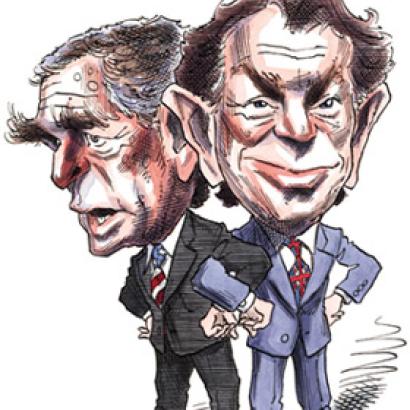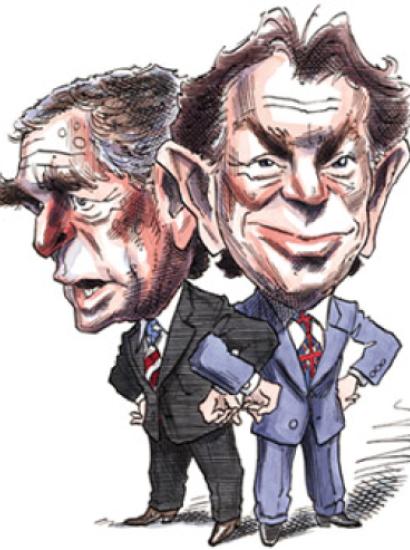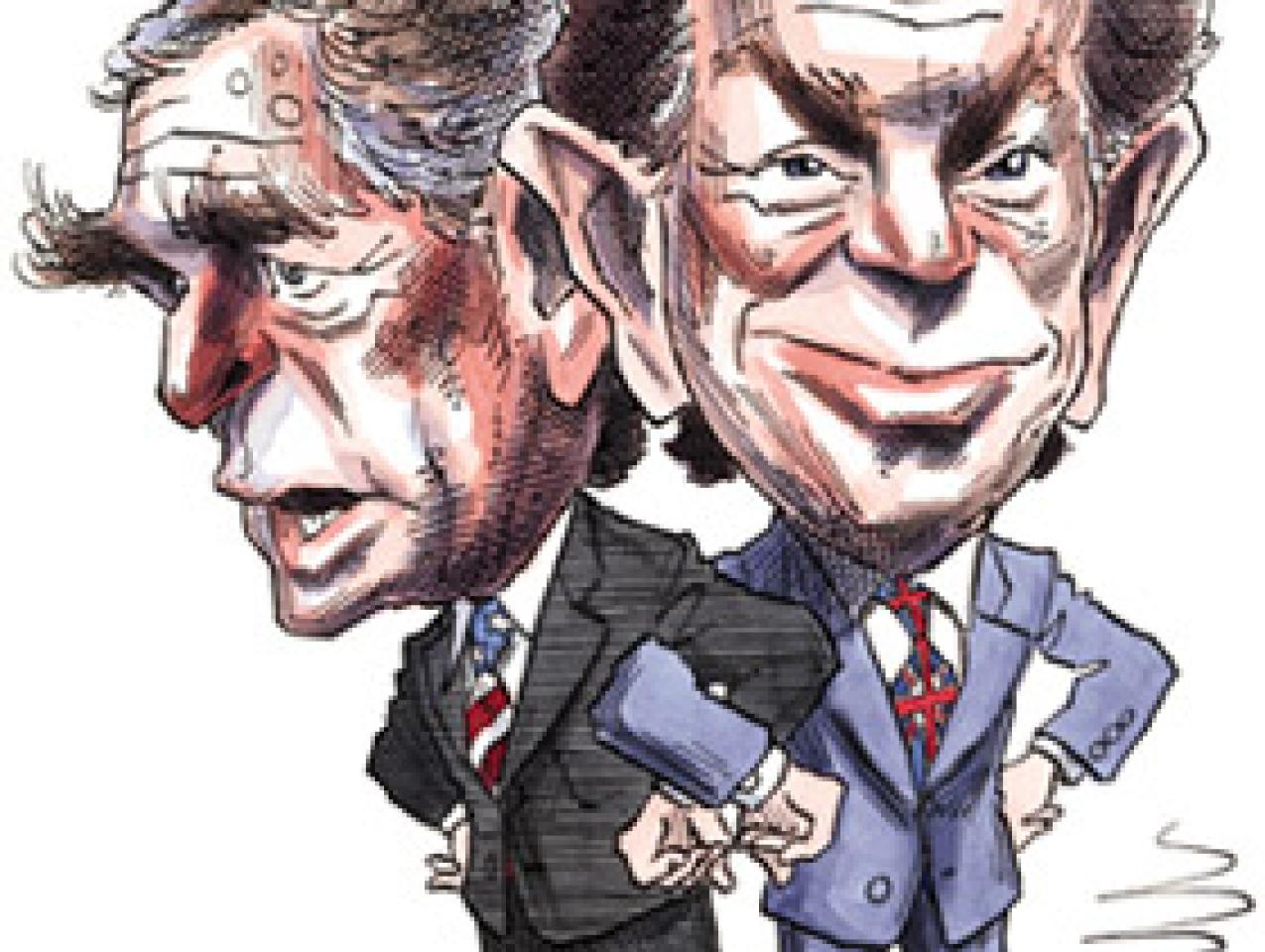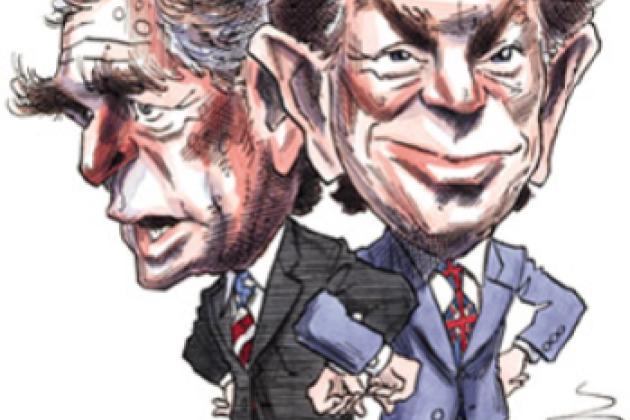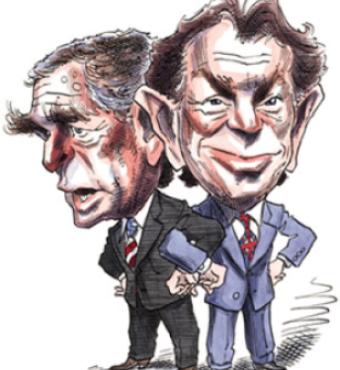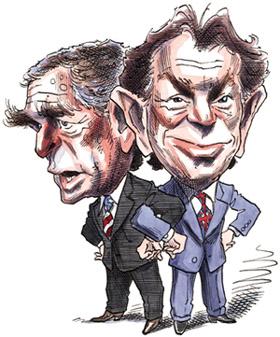- Security & Defense
- US Defense
- International Affairs
- US Foreign Policy
- The Presidency
- Politics, Institutions, and Public Opinion
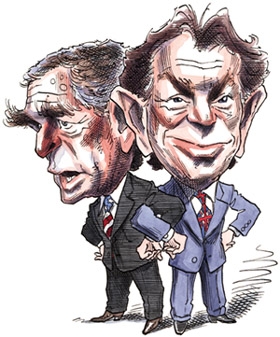
Prime Minister Tony Blair has certainly been President Bush’s best friend on Iraq. He has stood uncritically shoulder to shoulder with the president’s initiative from the earliest moments. At times, Blair has even taken the lead, as when he published both his dossier on Saddam Hussein’s violations of United Nations resolutions and a paper on his human rights violations. Blair has also traveled to those countries where the British historically hold closer and more influential relationships than the United States to lobby for support for the Iraq policy.
Blair has been such a close and certain ally that Americans have taken his support as a given, as a natural expression of the traditional “special relationship” between the United States and Britain. After all, Blair’s predecessor as prime minister, John Major, provided similarly close support for the senior George Bush during the 1991 Gulf War.
What Americans have not understood—largely because the American press doesn’t report in depth about British politics—is that Blair has been giving his staunch support on Iraq in the face of considerable domestic British opposition, which Major never encountered. Although Blair does enjoy enormous political strength at home, the degree of opposition about Iraq puts him at substantial political risk. Why is he taking this risk?
First, Blair believes in Bush’s Iraq policy and, as his closest ally, wants to influence and participate in the direction of that policy on behalf of Britain’s security interests. Second, Blair strongly believes that Britain’s special relationship with the United States must be protected and furthered—irrespective of the issue in question or the American administration in power. Third, Blair believes that his political strength allows him to brush aside any and all domestic political opposition—and that he should use that power to support what he believes are fundamental British interests.
The Special Relationship
The starting point for understanding Blair’s actions is to know that he is a very moral person. He views world politics through a prism of right and wrong. He believes strongly that Saddam Hussein is evil and must be stopped. In this sense, he sincerely agrees with President Bush and his purpose.
Blair viewed Slobodan Milosevic of Serbia in exactly the same way a few years ago and forcefully pressed President Clinton for collaborative action on Kosovo. Blair repeats frequently how proud he is of the role he played in the Kosovo matter, which seems to provide him with considerable personal impetus for taking strong action against Saddam Hussein.
Beyond this morally strong personal view of the world, Blair also believes that Britain’s interests are deeply rooted in its traditionally strong relationship with the United States. He starts from the view that Britain has fallen into the status of a second-rate military power that—along with the Western alliance—relies on the United States for security. Moreover, he believes that Britain continues as a front-rank economic power but that its strength strongly depends on the quality of its economic relationship with the United States. Britain is still the fifth-ranked trading nation in the world, and the United States is one of its top export customers. British business has its largest foreign investment commitment in the United States. For Blair, Churchill’s caution that Britain must always stay close to the United States remains salient advice.
There were, however, some difficult moments shortly after George W. Bush took office in 2001. Blair had had a famously close relationship—personally and politically—with President Clinton. But, for a variety of reasons, the relationship in recent years between Blair’s Labour Party and American Republicans has been very strained. So many observers wondered whether Blair would get along with Bush. And, in fact, when Blair first visited Bush just after the president’s inauguration the situation looked somewhat shaky. Blair was less than complimentary when he reported his opinion of Bush back to his colleagues. Luckily for the future of the relationship, Blair’s views were never reported by the media. Instead, Blair decided that the British-American relationship was far too important for him to even hesitate about embracing a warm relationship with Bush. Blair made a concerted effort to befriend Bush, and there has been no sign that Blair has had second thoughts about his approach.
Ironically, Blair at times has been accused of being too close to Bush, but he has defended himself by citing the importance of the relationship, going out of his way to point out that Britain and the Western alliance have benefited because of his consequent influence. The British Foreign Office and Blair’s advisers at Number 10 Downing Street claim that Blair has been influential in softening Bush’s policy on Iraq. They insist that Blair convinced Bush to change his rhetoric from demanding “regime change” in Iraq to “disarming” Saddam Hussein’s weapons of mass destruction. They add that it was also Blair who convinced Bush to avoid a bilateral coalition attack on Iraq in favor of weapons inspections, working for a wider coalition of support and getting the backing of the Security Council.
Blair’s Position of Strength
Blair’s ability to provide such strong British support for the United States on Iraq proceeds just as importantly from the strong position that he holds within his own political system. Simply put, this is an unusual time in British politics. Blair in particular and his Labour government in general face an unusually weak opposition. The Conservatives are in the political wilderness after suffering landslide defeats in the last two elections. The Labour Party has been ahead in the opinion polls by a large margin for nearly every day of its almost six years in office. The word in London at the moment is that Blair has “no formal opposition” except the British media. Some commentators even suggest that there may be a basic realignment in British party politics in which the Conservatives will give way to the third party, the Liberal Democrats, as the formal opposition. For most longtime observers of British politics, this possibility is almost unfathomable, but the very fact that it is a subject of serious discussion demonstrates how one-sided politics is at this time.
Real “opposition” politics exist at the moment only within Blair’s own Labour Party, which has a long-standing culture of internal bickering and argument. For the nearly six years he has been prime minister, however, Blair has enjoyed more peace and discipline inside the Labour Party than any previous Labour leader or prime minister. Blair continues to dominate the political landscape, and the vast majority of Labour members of Parliament are behind him. It is from this position of strength that Blair has pressed his initiative on Iraq, despite considerable skepticism and outright opposition.
Is Iraq Worth the Risk?
What then is the nature of Blair’s political risk on Iraq? To begin with, the British electorate has never been better than evenly split over the wisdom of attacking Iraq. The polls change monthly, of course, but the average range has been about 40–40 (with 20 percent undecided). This outcome presumes that the British would be acting as part of a coalition and with U.N. support. Take those conditions away and leave the situation as a bilateral Anglo-American action, and public opinion in Britain has been consistently and overwhelmingly opposed to any action. This state of public opinion contrasts strikingly with opinion at the time of the 1991 Gulf War, when public support was at about 90 percent. Also striking is how much lower a level of public support Blair has over Iraq relative to what Bush has enjoyed in the United States, where the trend in support, while declining over time, has been at its worst somewhere about 55 percent.
Blair finds his best support from the group that is usually his opposition: the Conservative Party. A much greater majority of Conservatives support an attack on Iraq than do Labour Party members. Most of Blair’s Labour Party is lukewarm about Iraq, with the overwhelming majority expressing deference to Blair but not real support for his leadership on the issue. More specifically, about 20 percent of Labour supporters are enthusiastic about Blair’s Iraq policy and another 20 percent are strongly opposed, with the rest in the deferential middle. The Liberal Democrats are overwhelmingly against the idea of war. In sum then, deference is a politically important descriptor in this situation because it suggests that Blair is personally responsible for the Iraq policy, whatever its success or failure. Further, it is important to note that the same large middle of the Labour Party who are giving him deference on Iraq are at the same time growing more disenchanted with Blair because his domestic policies seem too “conservative” and lacking in commitment to “traditional” Labour values.
Closer to the heart of Blair’s political power base, he has had to face down a number of members of his own Cabinet who disagree or are skeptical about Britain joining with the United States to take the lead on Iraq. The actual number in the Cabinet who strongly oppose the policy is probably fairly small, but many doubters and worriers fear that Blair and Labour’s years of success may be put in jeopardy by an unpopular Iraq war. They also chafe under Blair’s style of leadership, which many complain is too “presidential”—that is, too dismissive of Parliament and too dismissive of the concept of collective government imbedded in the prime ministerial–parliamentary system of government. On Iraq, they complain that Blair has proceeded on his own, only reluctantly allowing debate just before the decisions are taken. In the case of the government’s dossier on Saddam Hussein, the Cabinet was allowed to see and discuss the document only a day or so before it was presented to the House of Commons. Parliament had even less time—only a few hours—to review the document before the debate, and then Blair refused to allow a formal vote that would have shown more accurately the degree of opposition. Of course, this is not the first time, by a long shot, that there have been loud complaints about a prime minister running roughshod over his or her colleagues in taking policy initiatives. The rise of prime ministerial power has been a fact of life for a long time. But by his actions Blair has put himself in the position of staking his own power much more directly on the policies he chooses. Mrs. Thatcher can certainly explain to Blair how dangerous that approach can be.
Finally, what are the substantial arguments of those who oppose his strong support for the American policy on Iraq? First, although the British public endorses the war on terrorism just as strongly as Americans do, the British worry much more that the Iraq initiative is jeopardizing that effort. They also tend to doubt President Bush’s motives for pressing the issue at this time, accepting the criticism that Bush “manufactured” the Iraq crisis for political purposes in order to divert attention from the American economic recession. Nor do they have confidence in the thrust of American foreign policy. They worry that an attack on Iraq will further destabilize the Middle East and delay progress in settling the Arab-Israeli problem. In fact, they complain that attacking Iraq may well increase terrorism, including attacks on Britain itself. And even if a war against Iraq succeeds in overthrowing Saddam Hussein, Blair’s critics wonder whether the Americans will know how to administer the peace and transform Iraq’s political system in a beneficial way. Many British believe that their own country’s years of experience during colonial times in the Middle East in general, and Iraq in particular, taught them how difficult and complex governance in the region is—and that the Americans don’t understand what they are getting into. Finally, many observers do not buy the argument that Blair has had a positive influence with Bush because of the closeness of their personal relationship and the degree of Blair’s support. Rather, they argue that Blair has become a useful “poodle” for the American administration, which is otherwise bent on a dangerous unilateralism.
Many of these criticisms are, of course, familiar to Americans because they are part of our own national debate on the issue. But these criticisms have more bite in Britain, where the public is far more skeptical about the Iraq initiative.
Tony Blair is politically strong enough to press ahead with his support for President Bush—including the use of British troops—but he could indeed lose considerable political capital if Iraq goes wrong. Labour Party insiders wring their hands in worry that Iraq may bring an end to their remarkable six-year run of success. We are about to see.








